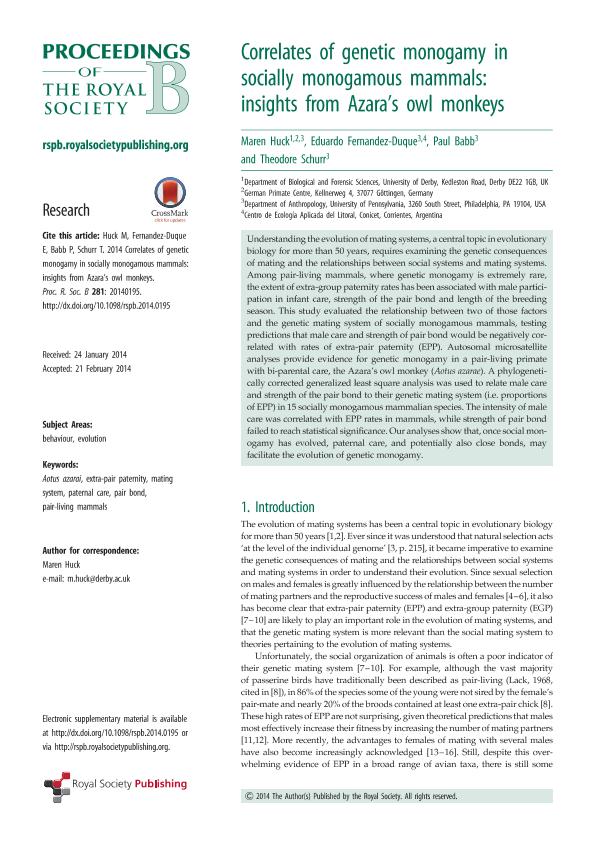Artículo
Correlates of genetic monogamy in socially monogamous mammals: insights from Azara’s owl monkeys
Fecha de publicación:
02/2014
Editorial:
The Royal Society
Revista:
Proceeding of Royal Society
ISSN:
1471-2954
Idioma:
Inglés
Tipo de recurso:
Artículo publicado
Clasificación temática:
Resumen
Understanding the evolution of mating systems, a central topic in evolutionary biology for more than 50 years, requires examining the genetic consequences of mating and the relationships between social systems and mating systems. Among pair-living mammals, where genetic monogamy is extremely rare, the extent of extra-group paternity rates has been associated with male participation in infant care, strength of the pair bond and length of the breeding season. This study evaluated the relationship between two of those factors and the genetic mating system of socially monogamous mammals, testing predictions that male care and strength of pair bond would be negatively correlated with rates of extra-pair paternity (EPP). Autosomal microsatellite analyses provide evidence for genetic monogamy in a pair-living primate with bi-parental care, the Azara’s owl monkey (Aotus azarae). A phylogenetically corrected generalized least square analysis was used to relate male care and strength of the pair bond to their genetic mating system (i.e. proportions of EPP) in 15 socially monogamous mammalian species. The intensity of male care was correlated with EPP rates in mammals, while strength of pair bond failed to reach statistical significance. Our analyses show that, once social monogamy has evolved, paternal care, and potentially also close bonds, may facilitate the evolution of genetic monogamy.
Palabras clave:
Aotus Azarai
,
Extra-Pair Paternity
,
Mating System
,
Paternal Care
Archivos asociados
Licencia
Identificadores
Colecciones
Articulos(CECOAL)
Articulos de CENTRO DE ECOLOGIA APLICADA DEL LITORAL (I)
Articulos de CENTRO DE ECOLOGIA APLICADA DEL LITORAL (I)
Citación
Huck, Maren; Fernandez Duque, Eduardo; Babb, Paul; Schurr, Theodore G.; Correlates of genetic monogamy in socially monogamous mammals: insights from Azara’s owl monkeys; The Royal Society; Proceeding of Royal Society; 281; 1782; 2-2014; 20140195
Compartir
Altmétricas




